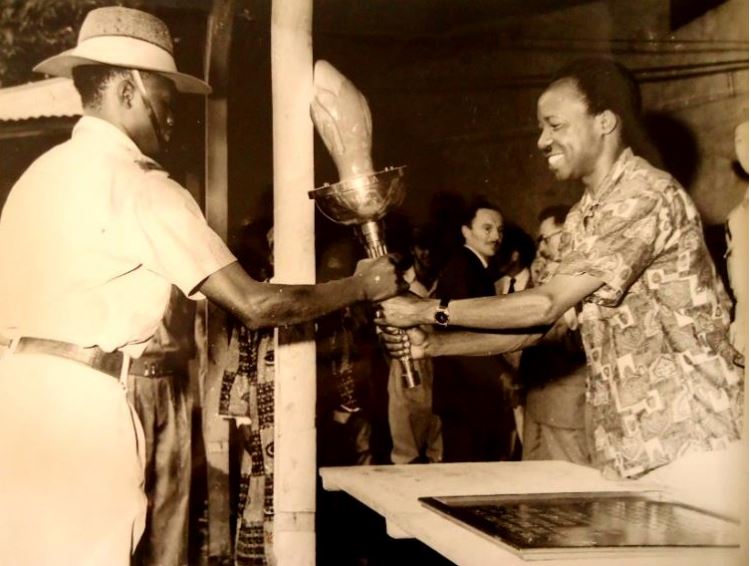Brigadier Alexander Nyirenda, the hero who placed the Uhuru Torch at Uhuru Peak on the summit of Mount Kilimanjaro, passed away on December 20, 2008, at approximately 12:45 p.m. He had been battling esophageal cancer since February 2008. Nyirenda’s courageous act of placing the Uhuru Torch on Kilimanjaro symbolized unity and freedom for the people of Tanzania. His legacy as a national hero and his contribution to Tanzania’s history will be remembered and honored for generations to come.

Mwalimu Julius Nyerere, the late founder of the Freedom Torch, also known as Mwenge wa Uhuru, had a vision when he ignited the torch. His words resonated, “We light the torch and place it on Mount Kilimanjaro to radiate beyond our nation’s borders; to bring hope to the hopeless, love amidst hatred, and respect where there is contempt.” Brigadier Alexander Nyirenda, an officer in the Tanzania People’s Defence Forces, fulfilled Mwalimu Nyerere’s wish by erecting the Uhuru Torch at the peak of Mt Kilimanjaro.
This iconic mountain, standing tall as the highest in Africa, holds great significance. On December 9, 1961, Nyirenda had the honor of hoisting the Tanganyika flag atop the mountain, simultaneously with its raising at the national stadium in Dar-es-Salaam, the capital of the newly independent nation. Climbing Mt Kilimanjaro presented its challenges, as it was more treacherous back then due to icy conditions and limited technology. Many feared embarking on the journey, doubting the chances of a safe return.
The expedition comprised 11 individuals, including photographers and radio presenters, who spent 16 days to fulfill this momentous responsibility. Nyirenda, reflecting on the experience, stated, “At midnight on December 9, we ignited the torch, coinciding with the Tanganyika flag-raising ceremony at the national stadium in Dar es Salaam.” As a tribute to his contributions, Brigadier Nyirenda was promoted to the rank of Brigadier by retired Tanzanian President Ali Hassan Mwinyi. Unfortunately, Brigadier Nyirenda battled esophageal cancer, and he passed away on December 20, 2008, at approximately 12:45 p.m.
Uhuru Torch – Mwenge wa Uhuru
The Uhuru torch in Tanzania has great historical and symbolic significance. It represents ideals such as freedom, equality, integrity, respect for human dignity, peace, hope, and the unity between mainland Tanzania and Zanzibar. Initially lit on National Independence Day in 1961 by the first president, Mwl Julius Nyerere, it was then taken to Mount Kilimanjaro, where it became a powerful symbol of national enlightenment. The Uhuru torch’s purpose is to inspire a sense of nationalism and to combat challenges like poverty, inequality, illiteracy, diseases, ethnicity, and racial discrimination. Every year, from March to October, the torch is carried throughout the country, passing through all districts to promote development initiatives. The government recognizes its importance by allocating the necessary funds for this nationwide event under the president’s office. The torch-running team and its leaders are appointed by the government to ensure its successful journey.
The Uhuru Torch holds significant symbolism in Tanzanian history and culture. Known as the “Torch of Freedom,” it represents unity, independence, and progress for the people of Tanzania. The Uhuru Torch was first lit on the summit of Mount Kilimanjaro, Africa’s highest peak, during Tanzania’s Independence Day celebrations on December 9, 1961.
Since then, the Uhuru Torch has become a powerful symbol of national pride and unity. Every year, leading up to Independence Day, the torch is carried in a relay across the country, covering various regions and districts. The relay symbolizes the unity and diversity of Tanzania’s people and serves as a reminder of the sacrifices made by those who fought for independence.
The significance of the Uhuru Torch extends beyond its ceremonial lighting. It represents the enduring spirit of freedom and resilience in the face of challenges. The torch’s journey across Tanzania is also an opportunity for communities to come together, celebrate their achievements, and reflect on the country’s progress.
Moreover, the Uhuru Torch serves as a beacon of hope and inspiration for future generations. It reminds Tanzanians of their shared heritage and the importance of upholding the values of unity, peace, and prosperity.
![]()


Comments